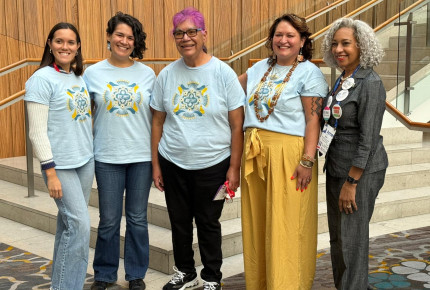Hoopa, CA – As the September 30th government funding deadline nears, Celena Donahue, from Humboldt County, joined more than 700 cancer patients, survivors, and American Cancer Society Cancer Action Network (ACS CAN) advocates from every corner of the United States, including Washington, D.C., Guam, and Puerto Rico, headed to Capitol Hill on September 16, to make their voices heard. Representing nearly every congressional district in the country, they highlighted the real-life impact these investments have on patients, families and communities nationwide.
Donahue, a tribal health consultant who is Pueblo Indian and whose family is Hupa, Yurok, and Karuk, met with members of California’s congressional delegation to discuss the need to prioritize proven cancer-fighting policies and federal investment in lifesaving cancer research and care, including funding that supports American Indian and Alaska Native communities.
“We all know someone who has been touched by cancer. In American Indian communities like mine, our families and Nations are disproportionately affected by this disease. That’s why I feel such a deep responsibility to share our stories with legislators and ensure they do more than listen,” said Donahue. “We need them to honor our stories with action and commit to ending cancer as we know it, for everyone.”
Over the last 30 years, substantial and steady increases in federal cancer research funding have fueled discovery and innovation that have led to a 34% decline in cancer mortality rates. However, future cancer cures are in jeopardy due to dramatic and unprecedented proposed reductions in research funding, staff eliminations, and policy shifts at the National Institutes of Health (NIH), the National Cancer Institute (NCI), and the Centers for Disease Control and Prevention (CDC). The administration has recommended an $18 billion cut to the NIH, taking funding back to levels last seen in 2003, or back as far as the mid-1980s, when considering biomedical inflation. Thankfully, congressional committees have rejected these proposed cuts to NIH and NCI, but the fight is far from over. Lawmakers must continue to push for a spending bill for FY2026 that includes the highest possible increases for cancer research and prevention.
Donahue also urged lawmakers to extend the health care tax credits that help make health insurance more affordable for over 1.75 million Californians through Covered California. According to the nonpartisan Congressional Budget Office, if Congress doesn’t extend these vital tax credits before they expire at the end of the year, 4.2 million people are projected to become uninsured.
“Without health coverage, cancer patients face delays, disruptions or even the end of treatment. In Native communities, the barriers are even greater and too often our relatives go without the care they need. Many put off lifesaving cancer screenings, which lead to diagnosis at a later stage, when treatment is harder and survival is less certain. Our teachings remind us that the health of one person affects the whole community. That is why Congress must act now to extend the health tax credits and save lives,” said Donahue.
Additionally, ACS CAN advocates asked Congress to support the bipartisan Medicare Multi-Cancer Early Detection Screening Coverage Act, legislation that would create a clear pathway for Medicare coverage of future MCED tests, once approved by the Food and Drug Administration (FDA) and proven effective. MCED tests have the potential to test for multiple cancers at once with a single blood test, adding an important additional option to help detect cancer.

